The Hour Blu-ray Movie
HomeThe Hour Blu-ray Movie 
Season 1BBC | 2011 | 360 min | Not rated | Sep 27, 2011
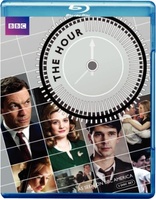
Movie rating
7.4 | / 10 |
Blu-ray rating
| Users | 0.0 | |
| Reviewer | 4.5 | |
| Overall | 4.5 |
Overview
The Hour (2011)
A behind-the-scenes drama and espionage thriller in Cold War-era England that centers on a journalist, a producer, and an anchorman for an investigative news program.
Starring: Ben Whishaw, Romola Garai, Dominic West, Anna Chancellor, Oona ChaplinDirector: Jamie Payne, Coky Giedroyc, Sandra Goldbacher, Catherine Morshead
| Period | Uncertain |
| Drama | Uncertain |
| Mystery | Uncertain |
| Thriller | Uncertain |
Specifications
Video
Video codec: MPEG-4 AVC
Video resolution: 1080i
Aspect ratio: 1.78:1
Original aspect ratio: 1.78:1
Audio
English: LPCM 2.0
Subtitles
English SDH
Discs
50GB Blu-ray Disc
Two-disc set (2 BDs)
Playback
Region A (B, C untested)
Review
Rating summary
| Movie | 4.5 | |
| Video | 4.5 | |
| Audio | 3.5 | |
| Extras | 2.0 | |
| Overall | 4.5 |
The Hour Blu-ray Movie Review
When Worlds Collide
Reviewed by Michael Reuben December 31, 2012Screenwriter Abi Morgan's best-known works in America are probably The Iron Lady (2011), which won Meryl Streep her third Oscar, and Shame (2011), a searing film portrayal of sex addiction that was more talked about than seen. In her native Britain, however, Morgan's most successful creation is a series for the BBC called The Hour, whose initial season was so popular that another was ordered as soon as it had concluded on August 23, 2011. That second season has just concluded on both the BBC and BBC America. The Hour is set in the 1950s. At its most literal level, it's about the creation of what was then an entirely new form of television: a weekly "news magazine" devoted to in-depth reporting on major stories. The notion of investigative journalism delivered by TV "news readers" is common enough today, but at the dawn of television, it raised both eyebrows and hackles. Especially in a country that did not have the explicit command of the First Amendment, news outlets on a network that was government funded, as the BBC was and remains, were expected to stick to the government view of the facts and otherwise shut up. The decision to push further, to challenge the government orthodoxy, caused collisions not only between the BBC and the government, but also between factions within the BBC. Morgan is far too effective an entertainer to rest everything on this historical clash of ideas. Around this piece of journalistic history, she also wove a Cold War espionage tale as shadowy as anything that John le Carré might have conceived (although Morgan's characters prefer the more glamorous world of James Bond). She placed her story at a pivotal moment in British history: the Suez Crisis that began in July 1956, when Egypt nationalized the Suez Canal. Thereafter, Israel invaded Egypt, and an Anglo-French force bombed Cairo. The ultimate resolution, while not especially successful for Egypt, validated its role as a player in international affairs and confirmed Britain's decline as an imperial power. This sense of the old order crumbling but scrambling desperately to shore up its foundations is everywhere in The Hour, and not just in the stories being related by the eager young reporters experimenting with a new programming format. Above all, Morgan created intriguing characters with backstories worth learning as they are gradually revealed. I suspect that, if one were to check Morgan's personal video library, there would be copies of Broadcast News in multiple formats. The complex personal and professional triangle at the heart of The Hour owes much to James L. Brooks's 1987 classic, but Morgan has given it such a distinctly British character (and Fifties flavor) that the resemblance may not be immediately obvious.

The trio at the center of The Hour is a pair of ambitious reporters, best friends Freddie Lyon (Ben Whishaw, most recently seen as Q in Skyfall) and Bel Rowley (Romola Garai, the "middle" version of the writer Briony Tallis in Atonement), and a suave anchorman, Hector Madden (Dominic West, The Wire's McNulty). Freddie and Bel are tapped by their BBC mentor, Clarence Fendley (Anton Lesser), to help him create a new kind of weekly news program to be called "The Hour". It's an opportunity for both of them to get out of what they consider a dead-end job cutting newsreels, but Freddie's enthusiasm is dampened when he discovers that Bel has been promoted to producer. He and Bel are friends, but they're also rivals. Freddie's ego takes another blow, when his bid to become the on-air face of "The Hour" is rejected in favor of Hector Madden's handsome features and reassuring delivery. Hector's very presence brings out both the best and the worst in Freddie, who fought his way to his present position on hard work and intelligence, whereas Hector got there on charm, good looks and knowing the right people. Tensions ratchet higher when Bel, with whom Freddie is openly in love, begins casting sidelong glances in Hector's direction. Hector is married to a wealthy society woman named Marnie (the luminous Oona Chaplin, daughter of Geraldine and granddaughter of Charlie). But Marnie lives in the country, and Hector stays in town—"for work"—and he has a wandering eye. These rivals and colleagues are joined by Lix Storm (Anna Chancellor), a former war photographer turned correspondent. As much a rarity as Bel in the boys' club of Fifties British journalism, Lix also provides a striking contrast. Bel may be a committed career woman, but both her attire and her deportment convey that she hasn't yet fully surrendered hope of the more conventional possibilities in a woman's life. Lix closed those doors long ago. Her life is her work, and her solace is a stiff belt of booze. At various points during the six episodes of The Hour, you can spot Bel alternately looking to Lix for guidance and eyeing her in alarm, as if Lix were a portent of Bel's future life, if Bel continues on her current path. An additional member of the reporting staff is a mysteriously quiet fellow named Thomas Kish (Burn Gorman, formerly of Torchwood), whose remarkably fluency in Arabic comes in handy once the Suez Crisis kicks into high gear. In fact, Mr. Kish has a covert life of which the audience knows much more than the staff at the BBC, but Freddie Lyons gradually uncovers it. Freddie stumbles across Kish's secrets while pursuing an investigation that, at least initially, he believes is unrelated to his work at "The Hour". In the opening episode, he attends an engagement party, where the bride-to-be is a former acquaintance he hasn't seen for years, Ruth Elms (Vanessa Kirby), daughter of Lord and Lady Elms (Tim Pigott-Smith and Juliet Stevenson, both of whom are extraordinary in their few scenes). When Ruth recognizes Freddie, she whispers to him that she needs help. Several days later, she's found dead, an apparent suicide, but Freddie knows otherwise, and every lead he follows confirms his suspicions. But his inquiries quickly lead him into a murky world of unidentifiable codes and secret messages, where no one is who they seem, and loyalties are unclear. It all may, or may not, have something to do with the situation rapidly unfolding in the Middle East. Rumors that the Soviet Union is backing Egypt have been circulating for weeks, and now there are rumors of a Soviet mole at the BBC. A government liaison named McCain (Julian Rhind-Tutt) becomes a frequent and unwelcome visitor to "The Hour", and he seems to have a special interest in Freddie and his activities. Freddie realizes that he's being followed, and he's not sure who it is: Soviet agents, the British secret service who suspect him of being a Soviet agent, or some unidentified third party. The spy game has suddenly become much less fun than when he and Bel are playing school charades where he calls her "Moneypenny" and she calls him "James". The Hour starts slowly, taking the time to identify individual characters and their situations and move them into place. As the various subplots overlap and intertwine more tightly in tune with the increasingly critical situation both in the Middle East and on the home front (where the government's aggressive policy provokes significant protest), The Hour gathers momentum and picks up its rhythms. Even the interpersonal subplots seem more fraught and consequential, as often happens in life when significant events are occurring all around. By the final hour, the entire enterprise is hurtling toward its destination like a locomotive at full throttle—even the editing rhythms speed up—and there's an almost breathless anticipation to the whole affair. Whishaw proves yet again that he's one of the most intriguing actors of his generation. Even when doing nothing (which isn't often), his Freddie is a bundle of nervous energy: always pushing, always probing, always looking for something, in the end always trying to prove himself worthier than his humble beginnings—and heedless of the consequences. (Freddie makes the common mistake of thinking that truth is its own reward.) West very smartly plays Hector by doing the opposite: relaxing, doing less, adopting the demeanor of a man who has always felt comfortable in his own skin and surroundings and doesn't feel he has anything to prove. Indeed, the only person who discomfits him at all is Freddie. ("How do you do it?" Hector asks him, in an uncharacteristic moment, when he actually has to prepare for an interview. "How do you know exactly the right question to ask?") In her portrayal of Bel, the woman who loves both men in her own way, Garai walks a fine line. Bel is capable of genuine intimacy with both Freddie and Hector, but she can also turn in an instant and push each one away. In Bel, Morgan has written and Garai performs a portrait of a contemporary woman struggling to invent an identity as she goes along. Once you've met her mother (Hetty Baynes), you can understand why.
The Hour Blu-ray Movie, Video Quality 
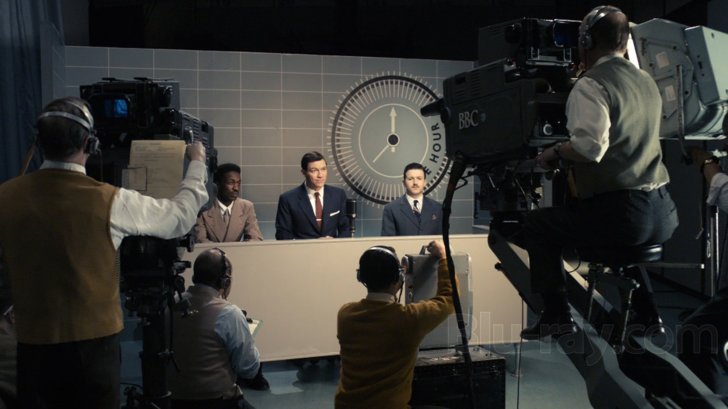
Season One of The Hour was shot by Chris Seager, the same cinematographer who shot the Fifties period drama Call the Midwife, which was also a BBC production. According to IMDb, Seager used the same Arriflex D-21 digital camera for The Hour, which would make sense, since most BBC productions are now digitally acquired. A comparison between the imagery of the two productions is instructive, because it shows how a cinematographer adapts his lighting to the needs of the story. Where Call the Midwife had the faded look of memories and scrapbooks, The Hour presents a bright and vivid image, even when dealing with matters shrouded in mystery. The goal is to make the viewer feel part of what is happening now, no doubt aping what a show like The Hour tried to do in an era when seeing TV in the home was still a novel experience. As with other digitally originated material, BBC has encoded The Hour for Blu-ray at 1080i, but the interlaced format is not apparent to the eye until one freeze-frames. In motion, the interlacing is not evident and does not generate visible artifacts. The image on these AVC-encoded Blu-rays is sharply detailed, revealing all of the fine patterns in the impeccably chosen wardrobe (discussed in detail in the extras) and the elaborate decor of locations like the Sherwin household and the Elms estate. Blacks are deep, which is essential for scenes involving multiple tuxedos, and contrast isn't overstated, which is especially important on the set for "The Hour", which involves a lot of light gray backgrounds. The color palette doesn't seem to be "muted" so much as limited, because the production design has been carefully controlled to limit the number of colors in a scene as much as possible. Consistent with the era in television, this is a simple, less colorful world. What colors there are, though, are sufficiently saturated to make an impression.
The Hour Blu-ray Movie, Audio Quality 
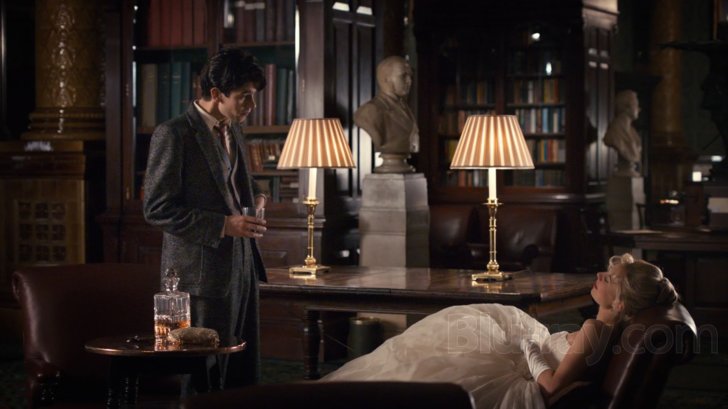
As is typical of BBC productions, The Hour has a stereo track, which is provided as PCM 2.0. It delivers the dialogue and essential sound effects clearly. Its limitations in surround ambiance can be observed in episode 5, where the team takes to the streets to record protests; despite the frenetic activity, the sound remains mostly in front, even when the track is played through a surround decoder. Still, the episode is plenty effective without the sounds of crowds and galloping horses running through the rear speakers. The atmospheric score is by Daniel Giorgetti.
The Hour Blu-ray Movie, Special Features and Extras 
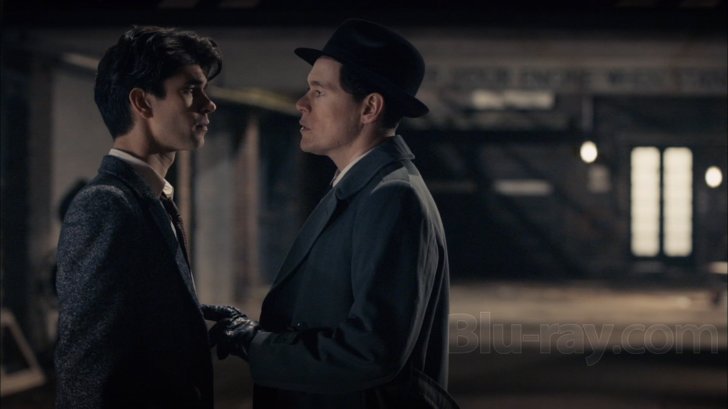
- Behind the Scenes (480i; 1.78:1; 10:09): This featurette focuses on the work of the production and costume designers and the care that went into the creation of the set for "The Hour" and related period sets.
- Creating The Hour (480i; 1.78:1; 20:26): Interviews with Abi Morgan, the cast and creative team. One of the most interesting aspects of the featurette is the opportunity to hear Whishaw, West and Garai speak in intonations other than those of their characters.
- Trailers: At startup, each of the two discs plays trailers that can be skipped with the chapter forward button and are not available once the disc loads. Disc 1 plays trailers for the new Upstairs, Downstairs and BBC America. Disc 2 plays trailers for Zen and Sherlock.
The Hour Blu-ray Movie, Overall Score and Recommendation 
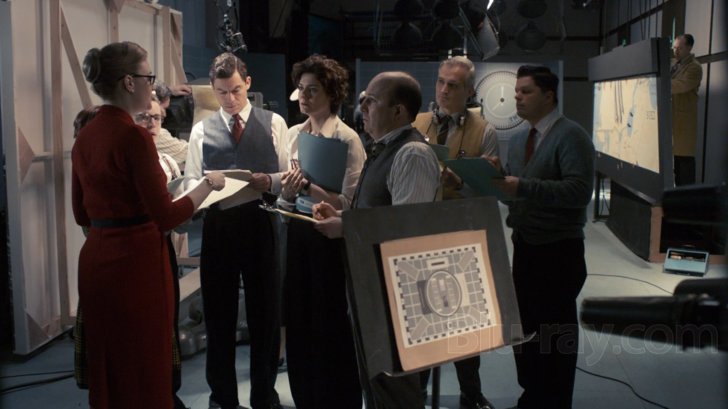
Television journalists still deal with many of the same issues of ethics and responsibility depicted in The Hour. One of the many virtues of Abi Morgan's drama is to capture them in the infancy of the medium and the excitement of first discovery. Unlike something like Aaron Sorkin's The Newsroom, which depicts an era where the issues have been fully formulated by decades of debate, The Hour presents them as if by accident, as characters doing things they hadn't planned to do with their lives find themselves facing dilemmas they could never have anticipated. Highly recommended.
Similar titles
Similar titles you might also like

The Debt
2010

Tinker Tailor Soldier Spy 4K
2011

The Americans: The Complete First Season
2013

The Lives of Others
Das Leben der Anderen
2006

The Manchurian Candidate
1962

The Paradise: Season Two
2013

Bon Voyage
2003

Shadow Dancer
2012

Pioneer
Pionér
2013

Child 44
2014

Omar
2013

Foyle's War: Set 8
2014

Allied 4K
2016

Mephisto
1981

Demonlover
2002

The Great Magician
Daai mo seut si
2011

Shutter Island 4K
10th Anniversary Edition
2010

Under Suspicion
1991

Whispers in the Dark
1992

Citizen Kane
75th Anniversary Edition
1941
